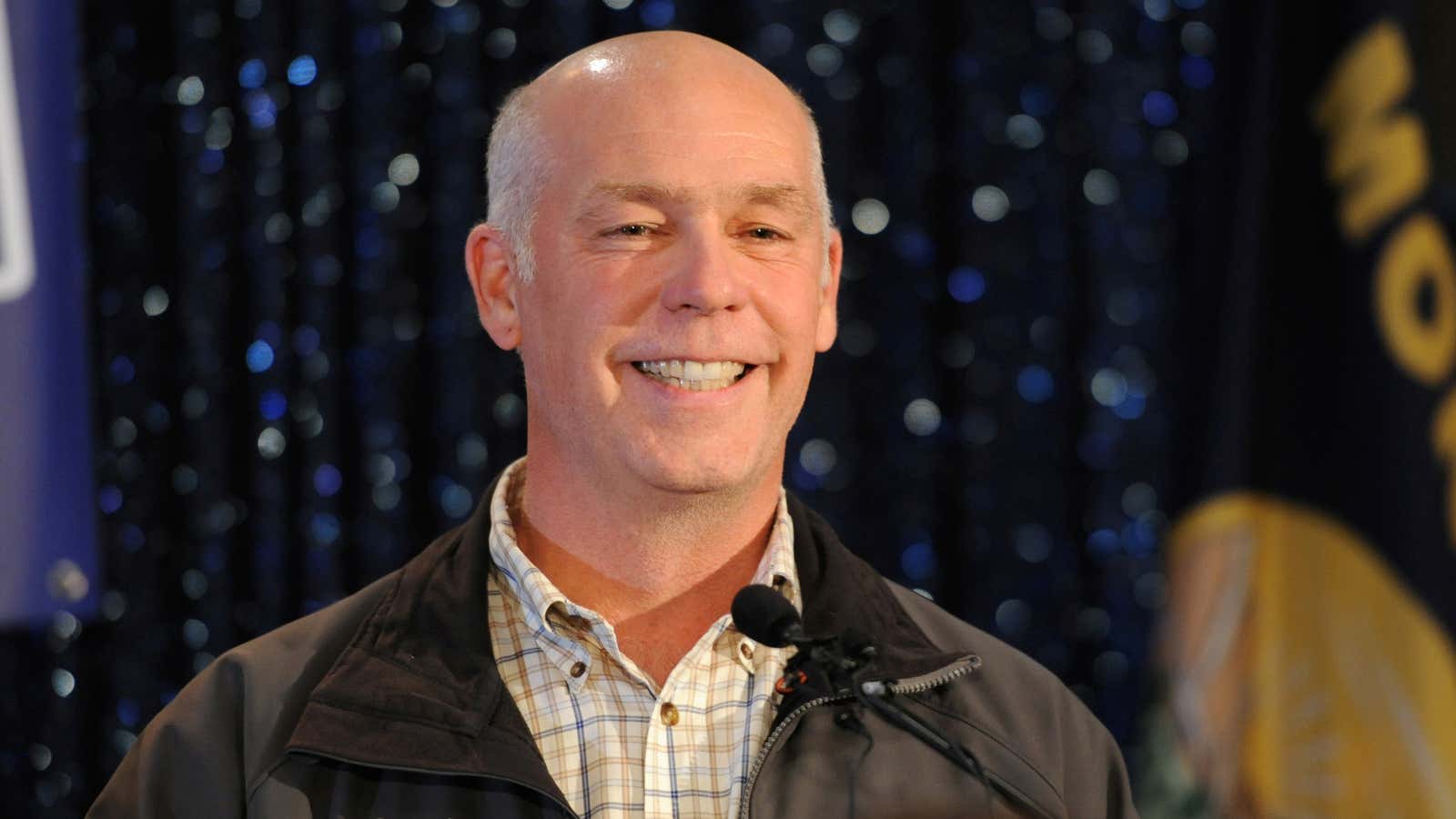Earlier this year, Americans asked themselves “Is it okay to punch a Nazi?” after white supremacist Richard Spencer was sucker-punched by a masked protestor during president Donald Trump’s inauguration. Now some are contemplating a new question—is it okay to assault a reporter, particularly when they are asking questions you don’t like?
Republican businessman Greg Gianforte from Montana just became the newest member of the House of Representatives, winning a decisive victory on May 25 (the latest count is 50.2% to 44.1% ) in a state that overwhelmingly voted for Trump in 2016. His campaign was undeterred by a last-minute charge of assault, after eyewitnesses saw Gianforte bodyslam a reporter attempting to question the candidate about the Obamacare repeal.
Now that he’s won, the assault, which broke the reporters’ glasses, is being touted by some journalists as the latest sign that Trump’s hostility toward the press has lead to an increase in violence. Certainly, some conservatives seem to have embraced Gianforte’s actions. Fox News guest Rachel Campos Duffy, a former MTV “Real World” star turned political pundit, implied Jacobs was asking for it:
Radio host Rush Limbagh called Gianforte’s actions “manly and studly.” Some Montana voters pulling the lever for Gianforte said they didn’t believe the reports that he’d assaulted a reporter, while some said they voted for him because he did.
Texas governor Greg Abbott took things a step further, joking Friday (May 26) about shooting reporters at a gun range.
So when is it OK to attack a reporter? From a short-term political standpoint, supporting Gianforte is a practical position, if not necessarily a moral one. Just as most members of Congress have stood behind Trump despite the White House’s many missteps, conservatives are weighing a fairly simple political calculus when it comes to the Montana election. Even with a majority in Congress, the fractured Republican party desperately needs every seat they can get in the House in order to pass legislation (the Obamacare repeal act passed by just one vote, after all, even thought it had strong support from the White House).
And journalists make particularly great targets for conservatives right now. Only 42% of Republicans think the media helps to keep political leaders in line, according to a recent Pew Research Center study, while almost 90% of Democrats do. That’s the widest gap since Pew started asking the question in 1985. Clearly, many Republicans have lost faith in the mainstream media, or at least in the role it plays in the US.
Still, several Republicans say their party’s failure to censure Gianforte signaled a dramatic shift in US politics.
“People don’t blink or bat an eye at things now that used to cause them to blush,” Mark Sanford, the Republican representative from South Carolina, said in an interview. His funding was yanked by the National Republican Congressional Committee four years ago after his ex-wife accused him of trespassing. The NRCC’s head Steve Stivers shrugged off Gianforte’s assault, saying “We all make mistakes.”
Making a stronger statement was conservative columnist Rick Wilson, a long-time Trump critic, who wrote that the moment represented nothing less than the “cultural collapse of the GOP into the Trump Troll party.” “Are you so past the rule of law, and lack so much confidence in your ideas that this is where you take political satisfaction?” he asked on Twitter. “If so, the GOP is not a party, it is a “mob.”
In Italy for his first Group of Seven (G7) summit, US president Trump chimed in, spontaneously telling the American press pool about the “great win in Montana.” He did not mention the assault allegations.
